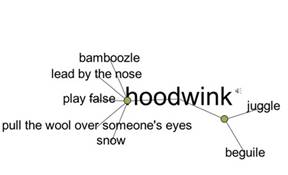Book Nook
Good reads for educators
Jamie McKenzie on Finding the Best Words

Ed-tech guru Jamie McKenzie has published a fascinating new book entitled Lost and Found: A Guide to Discovery Learning through Purposeful Wandering. In this excerpt adapted from the chapter "Finding the Best Words," McKenzie explains how tools like the Visual Thesaurus can "expand our thinking palette."
Whenever exploring complex ideas and issues, the success of our thinking will be bolstered by augmenting the complexity of the words and concepts we entertain as we proceed with our search for understanding. In many cases, limited vocabulary will narrow a search and restrict the depth and richness of the findings.
In most cases, the main concept we start with — be it beauty, enchantment, courage, intuition or some other idea — turns out to be much more complicated that we understood.
Beauty soon leads us to cosmetic, artifice and photoshopping as well as phrases like inner beauty and words like soul and spirit. All of these concepts are multifaceted, but in the common parlance, they are generally oversimplified and barely understood.
Enchantment
Our capacity to grasp complex ideas or deep concepts is tied in part to the shades and distinctions supported by our vocabularies. As we add new words to our collection, we can appreciate the difference between enchantment and charm, delight, capture and fraud.
If our brains are filled with simple word lists, we are likely to see things in simple terms and respond eagerly to those who give us simple answers to complex problems.
Web-based resources like the Visual Thesaurus support a kind of playful exploration of meanings that may enrich and expand vocabulary dramatically.
Starting with a word like enchant, we end up with an intriguing list of related terms:
|
enrapture |
enthrall |
enthral |
ravish |
|
transport |
delight |
witch |
jinx |
|
hex |
glamour |
trance |
fascinate |
|
entrance |
enamour |
charm |
catch |
|
capture |
captivate |
beguile |
becharm |
If we click on the word beguile, the Visual Thesaurus soon leads us to words like hoodwink and we discover that enchantment is not always a pleasant or positive experience.

Our first thoughts about enchant tend to be simply positive, but further exploration shows that the word has darker dimensions leading all the way to capture and witchcraft. We might end up "bewitched, bothered and bewildered." Or we may lose our life savings in a Ponzi Scheme!
I'm wild again
Beguiled again
A simpering, whimpering child again
Bewitched, bothered and bewildered am I
—Lyrics by Lorenz Hart
In these difficult economic times, after a decade of fraud and beguiling mortgage lenders, the term enchantment tilts toward the negative, as bamboozlement seems an appropriate substitute when waves of bailouts proceed along with bonus payments for the leaders of failing firms. The anger and feelings of betrayal experienced by the general public are understandable given the way the financial industry played fast and loose with the system, reaping fantastic quick rewards by ignoring basic rules. For most of us, the word bonus meant a payment for good service, but that definition seems outdated, as AIG handed out some $165 million to top executives to make sure they did not leave during a time of upheaval. Yet it was some of these same folk who oversaw the credit-default swaps that brought AIG to its state of near collapse.
It turns out that nearly all economic bubbles depend to some extent on enchantment. What begins as charm eventually turns into deceit. Bernie Madoff pulled off the greatest Ponzi Scheme of all time, beguiling hundreds of smart people and institutions into giving him their funds.
What began as a fantastic investment opportunity turned out to be truly fantastical, in the sense that it was fanciful, unrealistic and foolish. Opportunity turned into curse.

Managing Ambiguity
So much of life is vague and confusing, that it is difficult to grasp reality with much certainty or confidence. Reality is slippery at best. Do we hand over our fates to charismatic (snake) charmers like Madoff, or do we learn to ask tough questions, perform due diligence and acquire the vocabulary to match the challenge of making meaning when meaning is elusive?
"He is a real charmer!" "He tells stories."
"His investment plan was a myth."
Taken literally, the words charmer, stories and myth are relatively harmless, but in the current context, they are heavily laced with harmful connotations.

GoLive™ offers at least 141 colors. Some 18 of these contain the word blue in their names.
As we saw earlier in this chapter, a word like enchant can take on many shades of meaning as we move from literal to figurative. The Oxford American Writer's Thesaurus lists related words for enchantment in its thesaurus ranging from bliss, ecstasy, heaven, rapture, and joy on the one hand to magic, witchcraft, sorcery, wizardry, necromancy, charms, spells, incantations, and mojo on the other hand.
The Visual Thesaurus enables us to expand our thinking palette. This expansion gives us enhanced perception and thereby reduces our susceptibility to Ponzi schemes, myths and stories. We are less apt to be hoodwinked as we sharpen our vision and can see a "deeper shade of pale."
This excerpt is adapted from Jamie McKenzie's book, Lost and Found: A Guide to Discovery Learning through Purposeful Wandering, published here with the author's permission. The material is copyrighted and may not be further reproduced or published without his permission. Copies of Lost and Found may be ordered from The FNO Press Bookstore.

